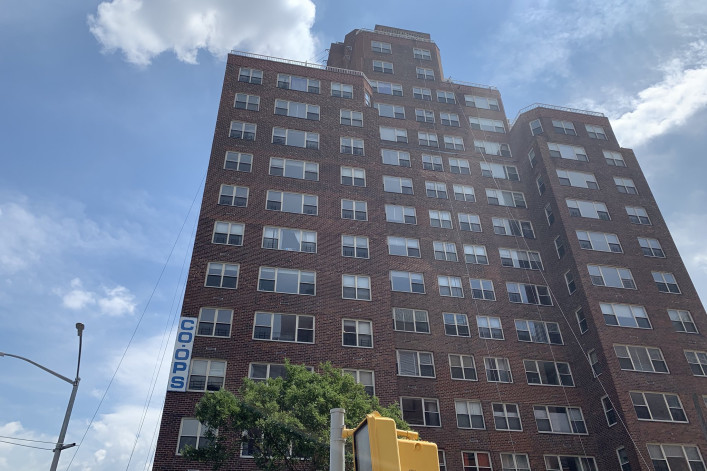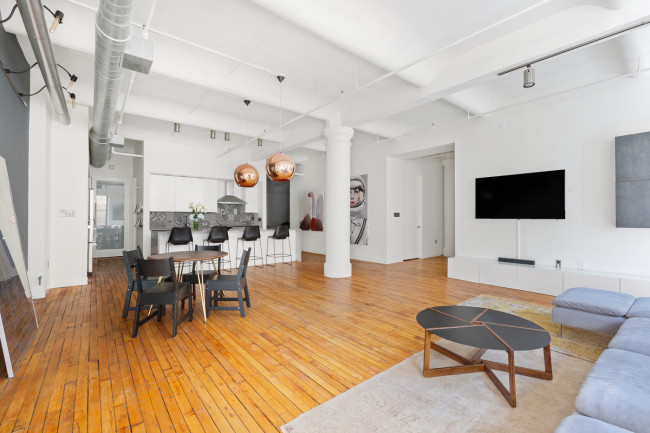The pros and cons of hiring an agent who also lives in your building to sell your place

Using an agent who also lives in your building turns out to be an asset in the Covid era, especially if your building is very strict about visitors.
Lots of New Yorkers who are selling or renting out their apartment turn to their neighbors for help—not just any neighbor, of course, but neighbors who happen to be real estate agents.
It’s a very New York thing to do, after all, there are a lot of apartments here and a lot of agents. And there are lots of advantages to turning to a broker who is a neighbor too in order to rent or sell your place, especially if you live in a co-op and want an insider with a connection to the board. There are also benefits to using someone who doesn’t live in a building, but who has done a lot of deals there, a so-called building expert. These are real estate professionals who have worked hard to establish themselves as the go-to agent for deals, learning everything there is to know about a building—almost as if they live there.
And it turns out, using someone who actually lives in the building is a real asset in the Covid era, especially if your building is very strict about visitors—or if there is another coronavirus shutdown. (New York City closed all public school buildings Wednesday because positive virus tests have increased—a chilling development that signals the second wave of the virus is here—and that more closures may be ahead.)
Of course, the pressure to use a specific agent may feel off-putting to some sellers or owners—as if your choice has been taken away. Or maybe there is a personality conflict, or maybe you suspect a broker of paying the building staff to get new business—all signs that you should look elsewhere for someone to market your place for sale or rent.
Read on for more about the pros and cons of using an agent who lives in your building or a building expert.
The Covid advantage
Barbara Fox, a broker and president of Fox Residential Group, has had a number of exclusives in the Upper East Side building where she has lived for 12 years. She says her insight as a broker resident is particularly valuable in the Covid era. For example, she can discuss what it’s like to use amenity spaces that are still closed and off limits for viewing, or the details of a building’s coronavirus cleaning policies.
Her dual role as broker and owner means she can also pass along feedback to a board member about what a prospective buyer may have noticed about a building, for example the need for brighter lights by the mailboxes, or a fresh coat of paint in the laundry room.
Brokers who had listings in their own building were able to show them virtually when the city was shut down, and that’s something to consider as NYC sees coronavirus cases rise.
When businesses in New York City first closed, Brenda Solomon, a broker at Fox Residential, found herself practicing on Zoom in her co-op apartment. She wanted to get a handle on the new application—and ended up putting it to good use during the pandemic, especially for the deals she had in her own building.
“I could get into the apartment when others couldn’t get into the building,” Solomon says. “I didn’t have to commute to show the apartment, and showing it virtually mean I was protecting the buyer, the other broker, and my building.” She says her long presence in her building means she’s cultivated relationships in her building that helped make deals go seamlessly, even during the pandemic.
Even now, agents who show in their own building describe being ready to show at any time, since they work from home because of the pandemic.
“I’ve been called in the early in the morning, late in the evening, and over the weekend with last minute requests to show. Since I’m typically home at these times, I’m more than happy to accommodate,” says Brian Morgan, a broker at Corcoran.
Brokers always leverage their relationships—and in-house ones have some powerful connections to work with. During the pandemic, this helped a couple, two doctors who were coming to help out in New York City on the front lines. They bought in a large condo building through Mitchel Askinas, an agent at Warburg Realty. He lives in the building and is also on the board.
Askinas got the contract for their two bedroom just before Covid hit and shut everything down. He needed to speed up their closing, so he made a few calls to board members and explained the need for a speedy package review, and gave board members a quick sketch of the purchasers’ qualifications. The board approved the purchase within four days.
He also had to get approval for the move-in when most buildings were not allowing outside vendors into the building. “We came up with a compromise on what could be brought in and how it would be done. My clients ended up being in the apartment in time to start their new jobs,” he says.
A long relationship with the building
Usually the reason you use an in-house or building expert is because they know the intricacies of a building, says Melissa Leifer, an agent at Keller Williams NYC.
For example, she says, “They know what the board does and doesn't want, they know how far you can push it with a sublet, any new building policies, or things the building is thinking of like maybe the building is going to go non-smoking in the next year."
“They will have the inside track on literally everything. They know how to get issues with an application resolved—quickly. They can pull strings others cannot. They have a direct line and relationship with all the people in the building. If the broker really is an expert, they can make the deal go faster,” Leifer says. (But sometimes there are reasons to avoid a broker who has done a lot of deals in a building—more on that later.)
A boon for co-op sellers
The advantage of working with a resident broker is more evident in co-ops, says Kobi Lahav, senior managing director/director of sales at Living NY.
“Co-ops are more difficult than condos and can reject someone without any reason,” Lahav says. So a recommendation from a broker who knows what the board looks for in an applicant carries more weight than someone new.
It can make the difference in ways you wouldn’t expect.
“Sometimes the board likes to see a board package done a certain way and that could be the difference between approval and rejection,” Lahav says.
An inside line of communication
Vickey Barron, a broker at Compass, says she works closely in an advisory capacity with the board in her building—other brokers that Brick spoke to for this article mentioned similar roles—which in turn boosts their knowledge and arguably, their standing in the building.
So for instance, she might be asked what sort of improvement should a building take on to boost sales. Should the building add a flip tax? Raise maintenance or use a one-time fee to pay for a project?
It takes work to be a building expert
But proximity shouldn’t be the only reason you go with your neighbor. While it is a major asset, it’s not everything, Barron says. You also need skills and experience, she says.
“I know a broker who rented an apartment in Time Warner in order to work the building,” she says. “I thought to myself, ‘What are you going to do? Hang out in the lobby?’”
It takes more than hanging around to be an expert on a place, Barron says. And brokers don’t necessarily need to live there if they work hard on knowing everything there is to know about a building.
That’s why a seller should expect a broker who claims to be an expert on a building “to be able to speak as if they built the building,” she says. That means knowing all there is to know about the construction, heating system, and breakdown of the layouts.
Vetting a resident broker or building expert
If you’re thinking of using a broker in your building to sell or rent out your place, Barron suggests reaching out to a board member and letting them know who you’re considering working with and asking if they have any feedback for you.
Even before you reach out for feedback, it will be very clear whether an agent is experienced in a building based on their history of listings and completed transactions in that building, says Douglas Wagner, a broker at BOND New York Properties.
In addition, an agent should “know the building's procedures for showing and applying for an apartment off the top of their head,” he says. They should be able to tell you about fees, financial requirements, co-op board applications, and house rules updates.
“Any agent who lacks this content is not an in-house agent,” he says.
Insight into a building’s historical pricing
Some brokers sound a little obsessed with numbers—the pricing, square footage, and other ways of measuring where your live—in a good way, of course.
Janet Traynor, an agent at Warburg Realty, likes to present her own charts on sales and rentals in her building at 301 East 79th St.
“I can tell people the financial climate and political climate in relation to sales and rentals every year since 2003,” she says. She also has a schematic with the exact square footage, according to the offering plan issued in 1984, which provides detailed information that an outside broker wouldn’t know.
“It takes years to compile all of the information of a good in-house broker,” she says.
Svetlana Choi, an agent at Warburg Realty, lives at 444 Central Park West and has done both sales and rental deals in the building. She says one of the biggest advantages is the knowledge she has about the balance of the reserve fund and the prices of nearly every apartment in the building, “which helps when shareholders are trying to figure out how to price their property.”
Gerard Splendore, a broker at Warburg Realty, is currently in contract with his 11th apartment at a Brooklyn Heights prewar and has a one bedroom in the building that will hit the market very soon.
An agent who does repeat business in a building will very often put out mailings announcing apartments that have been “just listed” or “just sold.” This communication, he says, “keeps the momentum going” and can give neighbors an early opportunity to trade up in a building.
An expert in the neighborhood
Another benefit to using some who lives in your building is that they are consumers too and are intimately acquainted with the neighborhood and what it has to offer. They will know the best restaurants, parks, supermarkets, dry cleaners, and transportation options, as well as who to call to repair things with experience in the building, Morgan says.
When you should not use a broker in your building
Be aware of the downsides of using someone who lives in your building as well, Leifer says. “I say this as someone who sells in their own co-op building and as an agent who is also a building expert,” she says.
It doesn’t make sense for rentals, she says. “The in-house broker works for the landlord and is looking out for their best interests.”
She also questions whether renters and buyers get the attention they need.
“When you have your own broker, you're hiring someone to look out only for your best interests. An in-house agent may not be able to give you as a renter or buyer enough help or attention because they have too many other clients, or because it's a conflict of interest. If you need someone to really walk through you the process it may behoove you to find your own broker,” she says.
She says a broker who is focused intently on one particular building may be too myopic.
“They may not be as up to date on price per square foot in the neighborhood. They may be so hyperlocal with their market knowledge and won't know where to advertise to get the buyers that will pay the most money,” Leifer says.
She recently put that theory to the test when she sold a condo in a building where there was a very prominent in-house expert. She beat his sales record there by doing her homework, she says.
“I sold the apartment faster and for a much higher price than the in-building expert broker. I did it because I understood the neighborhoods the buyers who move there are coming from and was able to market to those buyers. I researched the comps and when I did, I saw that other buildings in the neighborhood that had smaller and more unrenovated apartments were selling at a higher price per square foot. That proved to me that buyers were willing to pay more apartments that weren't as nice,” she says.
A sense of entitlement
Sometimes the situation is so cozy a broker can have the sense that they “own” the building, Lahav says.
When that happens, brokers treat a building like “an assembly line for commissions and don't really put too much effort into getting higher prices but rather just want to sell a unit and move on to the next one,” he says.
You may also find a resident broker is unwilling to negotiate their fee. An outside broker may be more willing so he or she can get their first deal done in the building, Lahav says.
Lisa Camillieri, a broker at Warburg Realty who sells and rents in her own co-op building and has sold dozens of units in another co-op as well, describes a more serious situation—when staff get paid for sending new clients to an agent. That’s illegal—you need to be licensed as an agent in order to get paid for a referral.
“Practices like kickbacks are a red flag that the staff may not think much of the agent, they are just in it for the money. There is a building where I used to represent nearly every seller. Another agent moved in and started paying the staff generously for referrals. I refuse to stoop to that level, so I had to let it go. Now I barely get any listings there,” Camillieri says.
Being overconfident and not hustling for deals can backfire on the in-house broker. Barron recalls the time she talked a seller out of using an agent who lived in the seller’s building.
“A woman said she wanted to hire me, but that there was an agent in her building, and she was always running into that agent. In fact, she saw her twice in one week in her laundry room, in the middle of the day,” Barron says.
If the seller thought that those frequent encounters were an indication that she was a good agent, Barron had some news for her. She recalls telling the woman, “Well, it’s the middle of the day and I’m out running around showing places. You should hire me. I can fold your clothes too if you want."
You Might Also Like





























